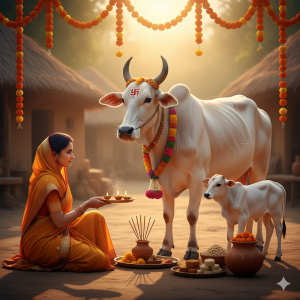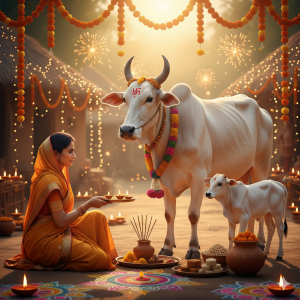
Vasu Baras, also known as Vasubaras, marks the beautiful beginning of the grand Diwali celebrations. This sacred day holds deep spiritual meaning as it honors the divine bond between a mother and her child through the worship of the cow and her calf. In Hindu tradition, the cow is regarded as a symbol of selfless love, nourishment, and prosperity — much like a mother’s unconditional care.
On Vasu Baras, devotees wake up early, bathe the cows, adorn them with garlands, and offer special prayers and food. The rituals performed on this day are believed to invite peace, wealth, and happiness into the home. It’s also a time to express gratitude for nature’s abundance and the blessings it bestows upon us.
As families prepare for the festive days ahead, Vasu Baras reminds everyone to begin Diwali with purity, gratitude, and devotion.
✨ Celebrate this Vasu Baras with thoughtful gifts and traditional offerings from MyGiftsy, where every gesture is a symbol of love and prosperity.
🌸 Meaning of Vasu Baras and Its Spiritual Significance
Vasu Baras, also known as Vasubaras, holds a sacred place in Indian tradition as the first day of the Diwali festival. The word ‘Vasu’ means cow, while ‘Baras’ means the twelfth day of the Krishna Paksha (dark fortnight) in the Hindu month of Ashwin. This day is devoted to worshipping Gau Mata (Mother Cow), who is deeply revered for her nurturing nature and divine grace. Just like a mother provides nourishment to her child, the cow sustains human life by offering milk and other essentials.
According to Hindu beliefs, the cow is a manifestation of Goddess Kamadhenu, the divine cow that fulfills all wishes. Worshipping her on Vasu Baras is said to bring wealth, peace, and prosperity to the household. It is also believed that those who perform the rituals with pure devotion are blessed with healthy children and family harmony. Thus, Vasu Baras beautifully symbolizes gratitude, abundance, and the eternal bond between mother and child.
🌿 Why We Celebrate Vasu Baras
Vasu Baras is celebrated to express thankfulness to the cow — an animal regarded as sacred and selfless in Hindu culture. She represents Dharma (righteousness) and Artha (prosperity), embodying values of compassion, service, and giving without expecting anything in return. The festival reminds people to live in harmony with nature and respect all living beings that contribute to human life.
According to ancient scriptures, Lord Krishna — who grew up among cows and cowherds in Gokul — emphasized the significance of Gau Seva (service to cows). By worshipping cows on this day, devotees honor Lord Krishna and Mother Earth together. This celebration sets the tone for Diwali by invoking divine blessings for prosperity, fertility, and happiness in the coming year. The day also encourages acts of kindness such as feeding the poor, sharing gifts, and spreading joy.
🪔 Why Vasu Baras is Known as the First Day of Diwali

Vasu Baras marks the beginning of the five-day Diwali festival. The worship of the cow symbolizes purity and the cleansing of the mind before the grand celebrations begin. It prepares devotees spiritually for the auspicious days that follow — Dhanteras, Naraka Chaturdashi, Lakshmi Pujan, Govardhan Puja, and Bhai Dooj.
The belief is that by performing Gau Pooja (cow worship) on this first day, families purify their homes and hearts, ensuring that the upcoming festival of lights brings not just external brightness but also inner peace and divine positivity. Starting Diwali with such devotion reminds everyone that before celebrating wealth and joy, we must honor the sources of life and sustenance. Hence, Vasu Baras beautifully represents the spiritual foundation of Diwali.
🪶 Steps to Celebrate Vasu Baras at Home
-
Early Morning Purification:
Devotees wake up before sunrise, clean their homes, and take a holy bath to begin the day with freshness and purity. The worship space is decorated with flowers, rangoli, and diyas, setting a sacred atmosphere for rituals. -
Decorating and Worshipping the Cow:
Cows are bathed, decorated with turmeric, kumkum, and colorful garlands. The mother cow and her calf are adorned with traditional ornaments. Aarti (prayer ritual) is performed, and special offerings like jaggery, rice, and wheat are made to them with devotion. -
Offering Food and Prayers:
Freshly prepared dishes such as poha, fruits, and sweets are offered to the cows. Devotees then bow before them, seeking blessings for family well-being and prosperity. Many people feed stray cows and distribute food to the needy as an act of charity. -
Family Prayers and Fasting:
Women, especially mothers, observe a fast on this day for the health and happiness of their children. They pray to Goddess Gau Mata for strength, fertility, and protection for their families. -
Evening Rituals:
In the evening, diyas are lit around the house, symbolizing the light of love and faith. Families gather to sing bhajans (devotional songs) and share the story behind Vasu Baras, keeping traditions alive across generations.
🎁 Celebrating Vasu Baras with MyGiftsy
Vasu Baras is not just about rituals — it’s a celebration of gratitude, care, and blessings. Make the day extra special by sharing joy with your loved ones through thoughtful gifts. At MyGiftsy, explore a range of traditional Diwali hampers, puja essentials, sweet boxes, diyas, and eco-friendly gifts perfect for this auspicious beginning of the festival.
Let your gifts reflect the purity and prosperity of this sacred day. Start your Diwali celebrations with love, devotion, and the divine blessings of Mother Cow — because true celebration begins with gratitude.
